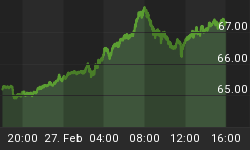When the most esteemed market strategists espouse questionable economic theories, they should not be able to do so without being exposed to critique. Recently, two revered men of finance, Bill Gross and John Rutledge, made some pretty extraordinary comments, remarks which haven't gotten the attention they deserve.
Let's Make Nothing!
On the Fox business block airing Saturday January 6th, Dr. John Rutledge of Rutledge Capital stated that America would be better off if we manufactured nothing and imported 100% of our goods from abroad. This is one of the most egregious arguments an economist can make. Having an economy where manufacturing is zero percent of G.D.P. (Currently manufacturing is less than 14% of America's G.D.P.) guarantees two pernicious outcomes. First, our already huge trade deficit would explode, putting greater pressure on the U.S. dollar as we send yet more of our country's wealth into foreign hands. Next, our very sovereignty would be in greater jeopardy as we would find ourselves at the mercy of erstwhile exporting countries; if they one day turned hostile, they could shut off our access to the tangible goods that are necessary for running our national defense and economy.
Imagine if you and your neighbor entered into a trade agreement in which he agreed to supply all your tangible goods and in return you agreed to send him pieces of paper with numbers on them (dollars) that were only redeemable within your domicile. This would be a grand deal for you as your neighbor toils, producing things of real value while you effortlessly print currency without backing or intrinsic worth. Your neighbor uses the dollars you send him to purchase pieces of your home and contents thereof. Everything appears fine until eventually your neighbor accumulates a concentrated position in your assets and/or you no longer maintain ownership of your possessions. Your neighbor then decides to consume more of his manufactured goods inside his increasingly wealthy household and sell his dollar denominate holdings of your home to the highest bidder. The problem is the market is already saturated with your currency and the value of your pieces of paper and assets plunge.
Our trade deficit will one day be subject to these same machinations. Our fiat currency system allows for the process to be protracted over many years, allowing some economists and politicians to blissfully proclaim that deficits don't matter. If the U.S dollar was backed by gold reserves the trade deficit would be a self-correcting process, one which would not allow for such imbalances nor the unnaturally low interest rates we see today.
Interest Rates and Growth
In addition to Mr. Rutledge's interesting comment, the eminent Bill Gross of PIMCO told a reporter from Bloomberg during a January 5th interview about the Fed's next interest rate decision that, "Slower economic growth, certainly slower nominal growth, ultimately forces the Fed to lower [rates]." He continued, saying that the Fed funds rate may be cut to "below the nominal growth rate in order to re-stimulate productive growth in the economy." It appears that Mr. Gross (a bond guru) is of the opinion that it is the Fed's responsibility to artificially inflate the value of assets. Not true.
Interest rates (which represent the cost of money) should be governed by the supply vs. demand for cash. Excess savings should produce lower interest rates, excess consumption higher ones. And the total cash available should be restricted by the supply of gold and silver, the way the cost of money is determined in a free market economy. Why do we trust a group of twelve people who meet in secret to decide the appropriate level of interest rates and growth in our economy?
But the worst distortion of economic tenets -- which Mr. Gross is not alone in violating -- is the belief that increasing the supply of money engenders productivity growth.
Increasing the supply of money may in the short term mislead producers to meet the increased demand for their products with increased production. However, the producers quickly realize that the increasing demand emanates from a flood of new money entering the system and there is no concomitant output of labor or effort behind consumers' newly acquired fiat money. The producers then realize they have no need to increase the output of their goods because they know the consumers will readily part with their new money as it does not represent the result of their labor. Consumers don't demand pricing power and producers can garner the same revenue by increasing prices as they would by increasing production. The result is inflation.
The only thing the Fed can create is inflation, as evidenced by the destruction of the purchasing power of the U.S.D. since the Federal Reserve Act of 1913. Economic growth and productivity have their roots in low taxes, low inflation and low interest rates, along with an unfettered and well educated populace. Artificially lowering rates today will only continue to undermine our currency and our economy.
Few economists are willing to espouse the truth behind what the Fed and Politicians are doing to our country. If we are losing the stewardship of John Rutledge and Bill Gross, we are all in trouble indeed.
**We have gained the exclusive right to bring you a special report on the recent Canadian royalty trust tax announcement from Roger Conrad, one of the leading commentators on this industry. His report contains a discussion of many individual energy trusts and can be downloaded here: http://www.deltaga.com/reportForm.asp?rep=4.















